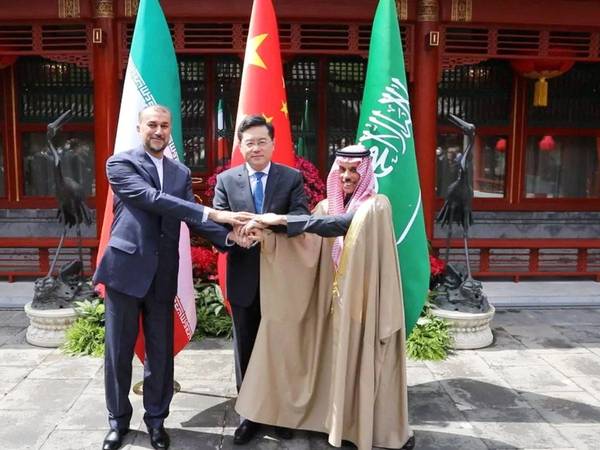Hopes for increased economic cooperation between Iran and Saudi Arabia following last year's diplomatic reconciliation have not materialized, due to historical and political factors
Saudi Arabia and Iran have a long history of hostility, usually taking opposing sides in regional conflicts such as Yemen, Lebanon, and Syria.
This competition, fueled by disruptive activities and outright attacks on Saudi land and oil infrastructure, strained relations in the last two decades. However, encouraged by China, the resumption of relations in 2023 presented the possibility of some cooperation between the two regional powers. However, despite this success, Saudi Arabia has opted not to engage in Iran's energy development initiatives, citing various reasons.
The Islamic regime in Iran has long sought political and military dominance in the region, angering Sunni Arab neighbors, with Saudi Arabia having the most to lose if Shia Iran establishes supremacy. This lies behind costly rivalries in Yemen and other parts of the region.
It was believed that following restoration of diplomatic relations, their economic ties would improve, notably in the oil sector. However, Saudi Arabia has made no investments in Iran, particularly in the energy sector, during the last year.
Iran has signaled a willingness to cooperate with Saudi Arabia on oil reserves, including the contentious Arash/Durra gas field in the Persian Gulf, off Kuwait’s coast. However, Iran's oil industry receives less investment than Saudi Arabia, and there are ongoing disagreements over the Arash/Durra field, which Iran, Saudi Arabia, and Kuwait all claim.
Saudi Arabia, which has historically relied on its massive oil reserves, is seeking to diversify its energy portfolio by investing in renewable energy projects outside of its borders. This includes substantial investments in the Caspian region and Central Asia, which have abundant energy resources but require investment and technological knowledge to fully realize their renewable energy potential.
These investments provide economic benefits for both Saudi Arabia and the host nations. They provide energy security, promote economic growth, and create jobs in the renewable energy sector. Furthermore, they support host nations' attempts to diversify their energy sources and minimize carbon emissions.
Divergent economic priorities serve as another barrier to collaboration. While Saudi Arabia's Vision 2030 emphasizes diversification away from oil, Iran grapples with Western sanctions and economic challenges, struggling to generate significant revenue from its oil exports. This disparity in economic goals impacts potential cooperation in Iran's energy sector, especially as Saudi Arabia focuses on bolstering its domestic economy.
US sanctions on Iran influence Saudi decision-making in expanding economic ties, as most other countries and investors who have stayed away. Iran has attracted a negligible amount of foreign investments since the United States withdrew from the JCPOA nuclear deal in 2018 and imposed sanctions.
Differences in technological capabilities, operating norms, and infrastructural development between the two nations may provide obstacles to possible investment initiatives. Disparities in resource management methods and industry norms may need to be resolved before major expenditures can be made.
The longstanding dispute between Iran and Kuwait over the Dorra oil and gas field has revived, with Saudi Arabia and its Arab ally Kuwait refusing to acknowledge Iran's claim to 40% ownership of the resource. Saudi Arabia claimed in July 2023 that it and Kuwait had "full rights" to the whole region, which was enthusiastically supported by all six Gulf Arab monarchs at their most recent summit in December.
A vast gap between Iranian and Saudi political and economic visions, such as the difference in goals between Saudi Arabia's Vision 2030 and Iran's fight against sanctions, provide further challenges.
These challenges are further compounded by disparities in technical and operational standards between the two countries, which need to be addressed before significant investments can be undertaken. Additionally, geopolitical interests play a crucial role, as both Saudi Arabia and Iran aim to reduce their dependence on oil. Saudi Arabia's strategy prioritizes diversification, potentially shifting its investment priorities away from Iran's oil sector. Likewise, Iran's endeavors to attract foreign investment may face competition from sectors or regions that align more closely with Saudi Arabia's geopolitical objectives, underscoring the complexities of engaging directly with Iran's oil assets.
